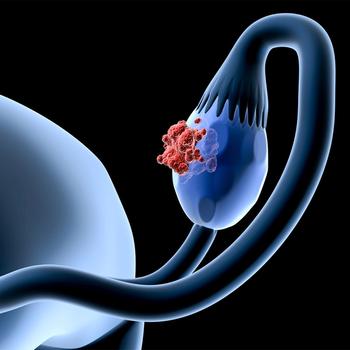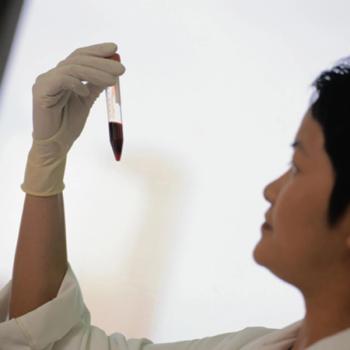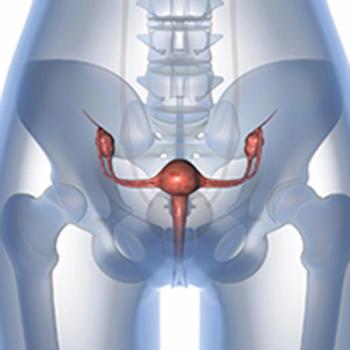
The future for immunotherapy treatment for gynecologic cancers may be found in drug combinations, according to Dmitriy Zamarin, M.D., Ph.D., who admits that these agents have been slower to demonstrate progress in this group of patients.

The future for immunotherapy treatment for gynecologic cancers may be found in drug combinations, according to Dmitriy Zamarin, M.D., Ph.D., who admits that these agents have been slower to demonstrate progress in this group of patients.

Renee Cowan, gynecologic oncology fellow at Memorial Sloan Kettering Cancer Center (MSK), discusses the importance of patients with ovarian cancer seeing an oncologist who specializes in the field.

Women with ovarian or breast cancer often don’t receive the genetic testing they need in order to devise the best treatment plans, a new study says.

Ovarian cancer is a hard taskmaster, but cancer teaches us important life, faith and family lessons

Nausea and vomiting are no longer top concerns for patients undergoing chemotherapy. Socio-psychological concerns, instead, have jumped to the forefront.

September is Ovarian Cancer Awareness Month, but many people still aren’t aware of the symptoms and risk factors that can sometimes lead to an ovarian cancer diagnosis. Here are two steps you can take to personalize your approach to ovarian health management by being "ovarian self-aware."

In a recent study, researchers were working on identifying different molecular targets to better provide personalized care to patients with ovarian cancer. To do this, they examined more than 4,000 tumor specimins.

There is a relationship between the genetics of BRCA1 and BRCA2 mutations and the risk of a patient with breast or ovarian cancer being resistant to platinum-based chemotherapy, according to recent research conducted at the Perelman School of Medicine at the University of Pennsylvania. The study’s senior author Katherine Nathanson, M.D., spoke with CURE about these findings.



Another case has been settled regarding Johnson & Johnson's Baby Powder and its possible link to ovarian cancer.

Cancer treatment may seem to involve a mysterious, unfathomable foreign language, but there are ways to improve those lines of communication.

Lynparza tablets (olaparib) tablets were granted FDA approval as a maintenance therapy for patients with recurrent epithelial ovarian, fallopian tube or primary peritoneal cancer, who are in a complete or partial response to platinum-based chemotherapy.

Richard Boulay, M.D., chief of the division of Gynecologic Oncology at the Lehigh Valley Health Netowrk, tells the story of removing a 140-pound tumor from Mary Clancy. The tumor had been growing for at least 10 years when it was caught by a CAT scan, and was about half her body weight.

A new agent showed a favorable toxicity profile for patients with epithelial ovarian cancer. The drug, mirvetuximab soravtansine (IMGN853), also demonstrated encouraging clinical activity in a phase 1 trial presented at the 2017 American Society of Clinical Oncology (ASCO) Annual Meeting.

Future treatment of ovarian cancer will include more interaction between molecular pathology and clinical pathology where genetic information can lead to more accurate pathologic diagnosis.

Losing their hair is one more way that cancer makes patients feel they've lost control over their bodies. It's not just physical, it's personal. Here are some tips for what to say.

Positive clinical trial results are released at a critical moment in time.

I see myself as a cancer ninja. Other cancer patients might prefer a gentler word. Either way, words are important and the choice should be ours.

Scoring the big NED often leads to that "Terminator" voice whispering in your ear.

CURE spoke with an expert on what is getting in the way of advancing treatment for rare types of ovarian cancer.

Fay Hlubocky, Ph.D., M.A., University of Chicago Medicine, discusses the challenges that women with ovarian cancer face that may be different than those diagnosed with other cancers.

Ovarian cancer screening for women who do not have symptoms of the disease may do more harm than good, according to the USPSTF.

Immunotherapy and PARP inhibitor combinations may be the future of ovarian cancer treatment, says Samir N. Khleif, M.D.

Many patients with cancer don't hesitate when discussing side effects like fatigue, nausea and neuropathy with their health care provider; however, there is often silence when it boils down to the sexual side effects of their treatment.